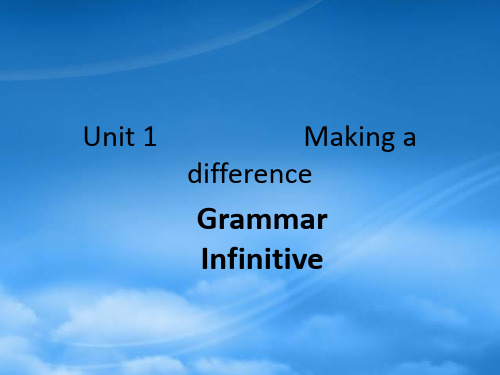Grammar infinitive 课件
合集下载
unit 1 Grammar Infinitive

6. My ambition is to work for a firm that develops computer software when I grow up.
Marty says…
7. Last year I invented…and a big company has decided to buy it from me. 8. I also have to do a lot of work, especially if I have been away for a while.
7.I find these problems are easy___. A. to be worked out B. to work them out C. to work out D. to be worked them out 8.I would love ___to the party last night but I had to work extra hours to finish a report. A. to go B. having gone C. going D. to have gone 9.____late in the morning , Bob turned off the alarm. A . To sleep B. Sleeping C. Sleep D . Having slept
5.作定语
1.I have something to say. 2.He has a lot of homework to do . 3.He is looking for a room to live in . 4.There is nothing to worry about.
注: a.如果不定式中的动词是不及物动词,则 不定式中要有介词.) 请给我一支写字的笔. Please give me a pen to write with.
Marty says…
7. Last year I invented…and a big company has decided to buy it from me. 8. I also have to do a lot of work, especially if I have been away for a while.
7.I find these problems are easy___. A. to be worked out B. to work them out C. to work out D. to be worked them out 8.I would love ___to the party last night but I had to work extra hours to finish a report. A. to go B. having gone C. going D. to have gone 9.____late in the morning , Bob turned off the alarm. A . To sleep B. Sleeping C. Sleep D . Having slept
5.作定语
1.I have something to say. 2.He has a lot of homework to do . 3.He is looking for a room to live in . 4.There is nothing to worry about.
注: a.如果不定式中的动词是不及物动词,则 不定式中要有介词.) 请给我一支写字的笔. Please give me a pen to write with.
高中英语 外研必修三module 4 grammar-infinitive 示范课(共21张ppt)

MODULE 4 GRAMMARINFINITIVE
Oh, dream!
2020/5/21
1
I HAVE A DREAM.(*^__^*)
To be a teacher was my dream. My dream was to be a teacher. But I find it hard to be a good teacher. What is your dream? (*^__^*)
TO HAVE BEEN STUDYING 发生在IS SAID ___之__前____, 持续一段时间,并有可能 继续进行下去。
注意宾:语1)、believe, think, consider, feel, make等动词可用于“动
词+ it +adj. / n+to do sth.”句型,其中使用it作____________,
而将_________________置于句末,做真正的_______nior High. to help
The students’ task is __________(study) happily. I promise ________ (help) you!
2020/5/21
8
自主学习
三、不定式作宾语 不定式作宾语,常跟在某些动词后:
决心学会选计划, decide/determine, learn, choose, plan, 拒绝答应想假装;refuse, promise, want/attempt, pretend,
2020/5/21
5
MODULE 4 GRAMMAR-
INFINITIVE
本节课学习目标
1.学习动词不定式作主语、宾语和表语。 2.学习动词不定式的各种形式和表达动作的先 后。
Oh, dream!
2020/5/21
1
I HAVE A DREAM.(*^__^*)
To be a teacher was my dream. My dream was to be a teacher. But I find it hard to be a good teacher. What is your dream? (*^__^*)
TO HAVE BEEN STUDYING 发生在IS SAID ___之__前____, 持续一段时间,并有可能 继续进行下去。
注意宾:语1)、believe, think, consider, feel, make等动词可用于“动
词+ it +adj. / n+to do sth.”句型,其中使用it作____________,
而将_________________置于句末,做真正的_______nior High. to help
The students’ task is __________(study) happily. I promise ________ (help) you!
2020/5/21
8
自主学习
三、不定式作宾语 不定式作宾语,常跟在某些动词后:
决心学会选计划, decide/determine, learn, choose, plan, 拒绝答应想假装;refuse, promise, want/attempt, pretend,
2020/5/21
5
MODULE 4 GRAMMAR-
INFINITIVE
本节课学习目标
1.学习动词不定式作主语、宾语和表语。 2.学习动词不定式的各种形式和表达动作的先 后。
Grammar08_Infinitive

过去分词:1. 表被动和完成。
2. 作表语、定语、宾补以及状语等。
Unit 8 Infinitive
动词不定式、v-ing动词和v-ed动词的区别
1. 不定式和分词作状语的区别 A. 分词作状语一般表示伴随,而不定式常常表示目的。 例句:
1. To test his idea, they recruited 276 healthy volunteers ranging in age from 18 to 35.
2. They stood by the roadside to talk about the plan.
他们站在路边为的是谈论这个计划。(目的)
Unit 8 Infinitive
动词不定式、v-ing动词和v-ed动词的区别
B. 分词作状语放在句子开头,表示原因、时间或条件。 动词不定式作状语时,表示Fra bibliotek的、结果或原因。
4. She could do nothing but _ her name under the circumstances.
A. to change
B. changing
C. to be changing D. change
Unit 8 Infinitive
• 《大学英语语法》第十一讲 - 动词不定式
5. It is easy __ me to see through his trick.
A. of B. for
C. with
D. to
6. It is careless __ you to make such a mistake.
A. of B. for C. that
D. with
7. TV makes it possible __ the world into your home in sight and sound.
2. 作表语、定语、宾补以及状语等。
Unit 8 Infinitive
动词不定式、v-ing动词和v-ed动词的区别
1. 不定式和分词作状语的区别 A. 分词作状语一般表示伴随,而不定式常常表示目的。 例句:
1. To test his idea, they recruited 276 healthy volunteers ranging in age from 18 to 35.
2. They stood by the roadside to talk about the plan.
他们站在路边为的是谈论这个计划。(目的)
Unit 8 Infinitive
动词不定式、v-ing动词和v-ed动词的区别
B. 分词作状语放在句子开头,表示原因、时间或条件。 动词不定式作状语时,表示Fra bibliotek的、结果或原因。
4. She could do nothing but _ her name under the circumstances.
A. to change
B. changing
C. to be changing D. change
Unit 8 Infinitive
• 《大学英语语法》第十一讲 - 动词不定式
5. It is easy __ me to see through his trick.
A. of B. for
C. with
D. to
6. It is careless __ you to make such a mistake.
A. of B. for C. that
D. with
7. TV makes it possible __ the world into your home in sight and sound.
湖南省高二英语Unit1 Grammar Infinitive课件 人教

9. The patient was warned ___oily food after the operation. A. to eat not B. eating not C. not to eat D. not eating
“感觉” feel “听” hear, listen to “使役动词”have, make, let “看” see, look at, observe, watch, notice
但当以上的动词用于被动式,to要还原: 1. They saw the boy fall suddenly from the tree. The boy was seen to fall suddenly from the tree.
5.I would love ___to the party last night but I had to work extra hours to finish a report. A. to go B. having gone C. going D. to have gone 6.____late in the morning , Bob turned off the alarm. A . To sleep B. Sleeping C. Sleep D . Having slept
eg: He spoke loudly (so as / in order) to be heard.
Ⅴ. 作状语
1. 表示目的: to / in order to / so as to
2. 表示原因 不定式可以用在作表语的形容词后作状语, sorry, surprised, happy, glad, eager, angry, foolish, right, wrong, slow, quick, rude, cruel, disappointed等。
Grammar---The Infinitive

*不定式的时态、语态 不定式的时态、 不定式的时态 主动 一般式 (not) to do 被动 (not) to be done
Байду номын сангаас
Eg.He is said to go abroad next month. Eg.He is said to be promoted soon. Eg. The old building is reported not be pulled down.
c. had better, would rather …than do anything/nothing… but /except complain. ** He does nothing but complain. speak. ** My dog does everything but speak.
What are the three non-predicates in English?
The Infinitive • to do sth • to be doing sth • to have done The Participle • doing • having done • done The Gerund • doing • having done
⑥作状语(目的、结果、原因等): 作状语(目的、结果、原因等): e.g.We eat to live; we don’t live to eat. 目的 e.g.We went to see him only to find him out. 结果状语 e.g.We are glad to see you. 原因状语
注意:不定式所修饰的词表不定式动作 注意: 发生的时间、方式时,常不加介!!! 发生的时间、方式时,常不加介!!!
Grammar--Infinitve

1.主语 (subject) 主语
To see is to believe.眼见为实。 .眼见为实。 注意 不定式作主语是,常用it作形式主语,而将不定 作形式主语, 不定式作主语是,常用 作形式主语 式移至句末。 式移至句末。 It's impossible for a child to learn everyt hing. It’s not easy to find your way around the town.
II. 用法 (uses): : 在句中可以做: 在句中可以做 • 主语 (subject) • 表语 (predicative) • 宾语 (object) • 宾语补足语 宾语补足语(complement) • 定语 定语(attribute) • 状语 状语(adverbial) • 独立成分(Independent Element) 独立成分( )
6.状语 状语(adverbial) 状语
表示目的、原因、结果。 表示目的、原因、结果。 We were very excited to hear the news.(原因 原因) . 原因 To pass the exam,he worked very hard. , . 目的: (目的:to / so as to/in order to) He hurried to the station, only to find the train had already gone. (结果 结果) 结果
不定式(The Infinitive)I 不定式 )
I. 定义 定义(definition): : 动词不定式是非谓语动词的一种, 是非谓语动词的一种 动词不定式是非谓语动词的一种,它没 有人称和数的变化,在句子中不能独立作谓 有人称和数的变化,在句子中不能独立作谓 但它仍保持动词的特点, 语,但它仍保持动词的特点,既可以有自己 的宾语和状语, 也有时态和语态的变化。 的宾语和状语 也有时态和语态的变化。 • He wants his students to read the book aloud.
Grammar微课-完整版课件

1. T__ra_v_e_l_in_g__ (travel ) along the old Silk Road
is an interesting and rewarding experience.
(2018 北京)
2. During the Mid-Autumn Festival, family
members often gather together ___to__s_h_ar_e_
(share) a meal, admire the moon and enjoy
moon cakes.
(2018 北京)
She likes to play with the child. My uncle feels it his duty to help others.
作定语 The next train to arrive was from New York.
用法
例句
I stayed there to
不 定 式
e.g. He refused to speak on the radio. He desired to see you. He wanted to know the truth. He pretended to have read the book when I asked him about it.
1. To review to+ infinitive
Read the sentences and answer the questions.
1. We let the raft sail down the river. 2. He agreed to go. 3. I don’t want to board a sinking ship. 4. The frightened man started crying. 5. We heard the two men shouting.
课件1:Grammar—Review of the infinitive

5. 不定式作定语 (1)不定式作定语表示将来的动作。 *I wanted to come to your birthday party, but I had a project to finish then. (2)不定式常放在某些名词或代词后作定语。 如果作定语的不定式是不及物动词, 或者不定式所修饰的名词或代 词是不定式动作的地点、工具等, 不定式后需要加相应的介词。 *I need a pen to write with. 我需要一支钢笔写字。
【即学活用】用所给词的适当形式填空 (1)It is important to remember when you’re trying to get along with people who are very difficult or seem _to__b_e_i_g_n_o_ri_n_g_(ignore) you, everyone is just doing the best that they can. (2)He is children’s books editor, whose job is _to__s_o_rt_(sort) through thousands of new titles published each year and select the very best ones in The Times. (3)The goal of this activity is _to__m_e_e_t_(meet) the needs of common people.
*I’m very sorry to have kept you sitting around doing nothing. 让你一直无所事事闲坐着我很抱歉。(keep发生在be sorry之前) *No harm seems to have been done. 似乎并没有什么危害发生。(do发生在seem之前, 且harm与do之间 是被动关系)
沪教牛津版8BU1-2 Grammar:infinitives课件

3
Exercises
I. Fill in the blanks with correct forms of the given words.
1. He has _p_la_n_n__e_d_t_o__w_r_i_te_ about the history of his
country. (plan/write) object
2 What is “not to be”?
negative 否定式
1 Introduction
How do we use infinitives?
1. Three teenagers offered _t_o__d_o_ (do) some volunteer work. verb object
Usage 4: Used as subject 作主语
It is + adj. + to do sth.
1. __It_i_s__a great pleasure _t_o__ta_l_k_ with him. 2. __It__is__ helpful _t_o_l_e_a_rn__ a new language. 3. __It_i_s__ dangerous _t_o_s_w__im__ in the sea.
Mark forgot to bringing the present he to bring
prepared for Vivien, so he promised saw her again the next time.
to see
Homework
Finish the exercises on page 7, 8 and 9.
1. She came _t_o_c_o_l_le_c_t_(collect) her books.
Module 4 grammar:infinitive

2 To have been caught in a sandstorm was a terrible experience.
3.There was nothng to be done 4.It’s frightening to be cycling to work in a
sandstorm
It is very hard to finish the work in ten minutes.
It is not easy to learn English well.
(2)作表语
Her job is to clean the hall. He appears to have caught a cold.
Thank you
有些动词如 make, let, have, see, find,watch,observe,notice, listen to, hear, feel 与不带to的不定式连用,但 改为被动语态时,不定式要加to
I saw him cross the road. He was seen to cross the road.
when you leave the room.
3 Please don’t forget t_o__d_ro__p (ask) Mr
Johnson to come tomorrow party.
4. You must be hungry. I’ll get something ___to__ea_t (eat)
作表语的不定式带to与不带to。作表语的不定 式通常带to,当主语部分含有实义动词do, 不定式作表语可省to。
The only thing I can do is (to)wait.
3.There was nothng to be done 4.It’s frightening to be cycling to work in a
sandstorm
It is very hard to finish the work in ten minutes.
It is not easy to learn English well.
(2)作表语
Her job is to clean the hall. He appears to have caught a cold.
Thank you
有些动词如 make, let, have, see, find,watch,observe,notice, listen to, hear, feel 与不带to的不定式连用,但 改为被动语态时,不定式要加to
I saw him cross the road. He was seen to cross the road.
when you leave the room.
3 Please don’t forget t_o__d_ro__p (ask) Mr
Johnson to come tomorrow party.
4. You must be hungry. I’ll get something ___to__ea_t (eat)
作表语的不定式带to与不带to。作表语的不定 式通常带to,当主语部分含有实义动词do, 不定式作表语可省to。
The only thing I can do is (to)wait.
动词不定式grammar-infinitive

(5) 作状语 A. 做目的状语,常用的结构:to do; in order to do, so as to do I come here to say good-bye to you.
B. 做结果状语,常与副词only, enough 或too连用。 only to do “不料(却)……,结果(却)……", 表示 一个没有料到的结果
Let's stop to have a rest. 咱们停下来休息一下吧。
优秀课件,精彩无限!
15
4) mean to do 打算做某事 mean doing 意味着…… I meant to catch up with the early bus. This means wasting a lot of money.
二. 用正确的词的形式填空。
1. They watered the soil _t_o_s_t_o_p___(stop) it getting
too dry.
2. Your sister is said _t_o_h_a_v_e__ta_k__en_(take) a plane
before.
3. When I came in, he pretended t_o_b__e_r_e_a_d_in_g_(read)
I saw him enter that building. I hope to see you again. I’m sorry to have given you so much trouble. He seems to be eating something. She dislikes to be to优ld秀课t件o,精d彩o无限w!hat she dislikes.13
课件2:Grammar—Review of the infinitive

(3)在sb. be said/believed/known/reported/considered/thought + to do/to have done结构中,不定式用作主语补足语。 He is thought to have acted foolishly. Now he has no one but himself to blame for losing the job. 大家都认为他表现得很愚蠢。现在要为他的失业负责的不是别人,而是 他自己。
4.作宾语补足语 (1)不定式作宾语补足语时,宾语和不定式之间在逻辑上是主谓关系,不定式 表示将要发出的主动动作。常接不定式作宾语补足语的动词(短语):advise、 allow、ask、beg、cause、encourage、expect、forbid、force、intend、 invite、order、persuade、prefer、require、remind、tell、want、warn、 wish、call on、depend on等。 Tell your child clearly and firmly that you expect them to do their homework responsibly. 清楚并坚定地告诉你的孩子你希望他们认真做功课。 Having finished her project, Professor Smith was invited by the school to speak to the new students. 完成项目之后,史密斯教授被学校邀请去给新生讲话。
Thank you!
更多精彩内容请登录:
6.作状语 (1)作目的状语,可用so as to/ in order to替换,但 so as to一般不 可置于句首,意为“为了;想要”。 To make it easier to get in touch with us, you’d better keep this card at hand. 为了便于联系我们,你最好将这张卡片放在身边。 To protect the balance of nature, we should pay attention to improving people’s environmental awareness. 为了保护自然的平衡,我们应该注意提高人们的环境意识。
相关主题
- 1、下载文档前请自行甄别文档内容的完整性,平台不提供额外的编辑、内容补充、找答案等附加服务。
- 2、"仅部分预览"的文档,不可在线预览部分如存在完整性等问题,可反馈申请退款(可完整预览的文档不适用该条件!)。
- 3、如文档侵犯您的权益,请联系客服反馈,我们会尽快为您处理(人工客服工作时间:9:00-18:30)。
object
• 带“to”的短语不一定都是动词 不 定 式 , 比 如 according to,
stick to, listen to, pay
attention to, lead to, look forward to等。“to”在上述短 语中作介词,后接名词,代词或 动名词。
The End
object
• Readers were pleased and surprised to find that a scientist could write about his work in a way that ordinary people could understand.
adverbial
People who listen to Hawking’s lectures sometimes find it difficult to understand him, because his thoughts and ideas often seem as large as the universe he is trying to describe.
object
• To explain what they have seen, they build a theory about the way in which things happen and the causes and effects.
adverbial
• But if, like Hawking, they are studying something that is too large or too difficult to observe directly, they will use a model to test the theory. adverbial
• I went to the station only to find the train had gone.
• (结果状语)
表语 (predicative)
• 在系动词后面: •seem, be, become, look, sound, taste, smell, feel
• One day, your doctor tells you that you have an incurable disease and may not have more than twelve months to live.
adverbial
• He continued his exploration of the universe and traveled around the world to give lectures.
adverbial
• Since then, Hawking has continued to seek answer to questions about the nature of the universe.
Grammar
Infinitive
动词不定式的形式 Forms of Infinitive
• to do • not to do • to be done • 作用
Functions of Infinitive
• 主语 (subject) • 宾语 (object) • 表语 (predicative) • 定语 (attribute) • 状语 (adverbial)
attribute
• There did not seem much point in working on my PhD -- I did not expect to survive that long.
object
• But in order to get married, I needed a job, and in order to get a job, I needed a PhD.
主语 (subject)
• It is kind of you to help me. • (形容词修饰人,用of) • It is important for you to study English. • (形容词修饰动词不定式,
宾语 (object)
•I found it important to study English. • (形式宾语)
• In the book, Hawking explains both what it means to be a scientist and how science works.
subject
• Scientists look at the world and try to describe and explain what they see.
定语 (attribute)
•sth. to eat •( eat sth.) •a room to live in •(live in a room)
状语 (adverbial)
• I’m pleased to meet you. • (原因状语)
• in order to = so as to = to • (目的状语)
• 带“to”的短语不一定都是动词 不 定 式 , 比 如 according to,
stick to, listen to, pay
attention to, lead to, look forward to等。“to”在上述短 语中作介词,后接名词,代词或 动名词。
The End
object
• Readers were pleased and surprised to find that a scientist could write about his work in a way that ordinary people could understand.
adverbial
People who listen to Hawking’s lectures sometimes find it difficult to understand him, because his thoughts and ideas often seem as large as the universe he is trying to describe.
object
• To explain what they have seen, they build a theory about the way in which things happen and the causes and effects.
adverbial
• But if, like Hawking, they are studying something that is too large or too difficult to observe directly, they will use a model to test the theory. adverbial
• I went to the station only to find the train had gone.
• (结果状语)
表语 (predicative)
• 在系动词后面: •seem, be, become, look, sound, taste, smell, feel
• One day, your doctor tells you that you have an incurable disease and may not have more than twelve months to live.
adverbial
• He continued his exploration of the universe and traveled around the world to give lectures.
adverbial
• Since then, Hawking has continued to seek answer to questions about the nature of the universe.
Grammar
Infinitive
动词不定式的形式 Forms of Infinitive
• to do • not to do • to be done • 作用
Functions of Infinitive
• 主语 (subject) • 宾语 (object) • 表语 (predicative) • 定语 (attribute) • 状语 (adverbial)
attribute
• There did not seem much point in working on my PhD -- I did not expect to survive that long.
object
• But in order to get married, I needed a job, and in order to get a job, I needed a PhD.
主语 (subject)
• It is kind of you to help me. • (形容词修饰人,用of) • It is important for you to study English. • (形容词修饰动词不定式,
宾语 (object)
•I found it important to study English. • (形式宾语)
• In the book, Hawking explains both what it means to be a scientist and how science works.
subject
• Scientists look at the world and try to describe and explain what they see.
定语 (attribute)
•sth. to eat •( eat sth.) •a room to live in •(live in a room)
状语 (adverbial)
• I’m pleased to meet you. • (原因状语)
• in order to = so as to = to • (目的状语)
